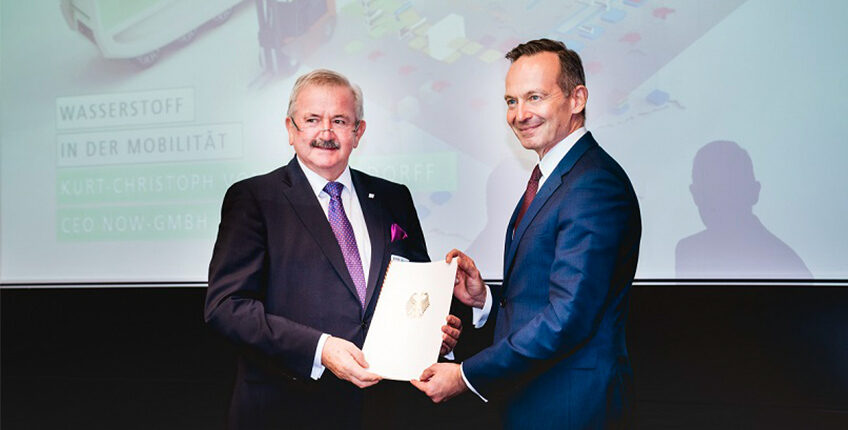The Federal Ministry for Digital and Transport (BMDV) is supporting the ramp-up of fuel cell production for heavy-duty transport in Germany. Today in Berlin, Federal Minister Dr. Volker Wissing presented a consortium of 19 Fraunhofer institutes with a subsidy note of over 80 million euros for the project entitled: ‘H2GO – National Action Plan for Fuel Cell Production’. The project will be financed from the ‘Automotive Industry Future Fund’.
Dr. Volker Wissing, Federal Minister for Digital and Transport: “The alliance with the Fraunhofer-Gesellschaft pushes the development of fuel cell production to another level. With our funding, we want to help generate marketable products in the field of fuel cell technology based on successful research and development – and in so far as is possible, on an industrial scale. The solutions that are developed will be made available digitally to all participating partners in a virtual reference factory. This strengthens the competitiveness of our domestic industry and makes a major contribution to significantly reducing the costs of hydrogen vehicles in heavy-duty transport. We urgently need climate-friendly options in this sector.”
The growing volume of traffic in road freight transport is still leading to an increase in CO2 emissions, despite progress in terms of consumption and exhaust gas technology. The need to develop alternatives to fossil energy sources is therefore great, particularly in heavy-duty transport.
Through the H2GO project, the BMDV is funding the pooling of the activities of 19 Fraunhofer institutes in a total of 9 federal states. The 19 institutes are working on creating the conditions for efficient mass production of fuel cells that convert hydrogen to electricity on board vehicles. H2GO is particularly geared towards small- and medium-sized businesses, represented along the entirety of the value chain of fuel cell production – from manufacturing technology to machinery and plant engineering, to in-vehicle applications in heavy-duty transport.
Prof. Reimund Neugebauer, President of the Fraunhofer-Gesellschaft: “Hydrogen is a key element of the energy transition. To enable hydrogen as an energy source to penetrate nationwide, it must be produced at market prices, in sufficient quantities and in a climate neutral manner, and used with a high CO2 reduction rate. Particularly cost-effective, robust technologies for the economic production of fuel cells are needed in heavy-duty transport to achieve this. This will not only bring us forward in terms of climate policy, but it will also position fuel cell production as a central area of expertise in Germany as a location, as well as Europe.”
The 19 Fraunhofer institutes will develop new manufacturing solutions together with local networks in regional technology hubs. Through an overarching ‘virtual reference factory’, digital images of the production solutions that are developed are to be made available to all participating partners. This will create a virtual reference architecture for fuel cell production.
On the Automotive Industry Future Fund
The Automotive Industry Future Fund was launched in 2020 in the framework of the federal government’s ‘Concerted Action on Mobility’ for the purposes of supporting the transformation of the automotive industry to sustainable and digital mobility. In total, one billion euros are available under this framework until 2025 for the digitalization of the automotive industry, the strengthening of sustainable value chains for future mobility as well as for transformation hubs.
Photos of the subsidy note presentation can be downloaded here.
Image source: BMDV


